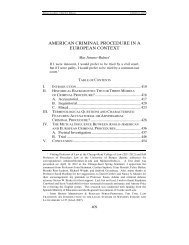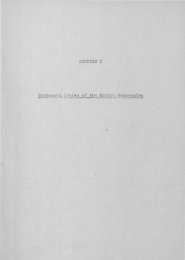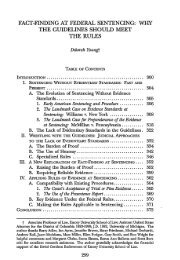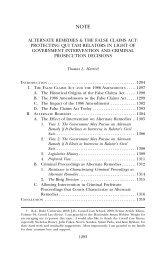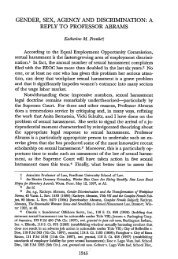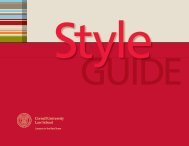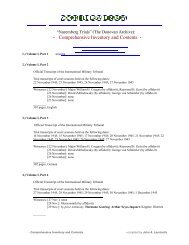JUDICIAL CLERKSHIP HANDBOOK - Cornell University Law School
JUDICIAL CLERKSHIP HANDBOOK - Cornell University Law School
JUDICIAL CLERKSHIP HANDBOOK - Cornell University Law School
You also want an ePaper? Increase the reach of your titles
YUMPU automatically turns print PDFs into web optimized ePapers that Google loves.
WRITING SAMPLES<br />
Your writing sample should be the best legal writing you have done. Typically judges prefer<br />
no more than 10‐15 pages, so if your preferred writing sample is longer, send a discrete<br />
section. It can be a memo from a summer job, a portion of a moot court brief, or a part of a<br />
writing competition note that you submitted to a journal. If at the time you are applying<br />
you have a law journal note, send that. Indicate clearly on the first page the extent to<br />
which it has been edited by someone else. Additionally, you should proofread the<br />
document and check your bluebook cites. You should also be prepared to submit a legal<br />
memo or brief as well (or work produce from a research assistantship for a professor, if it is<br />
specifically focused on cases) if you are asked.<br />
If you are sending something you worked on for an employer, be sure to obtain (and make<br />
clear to the judge that you have obtained) the employer's permission to use the materials.<br />
Be very aware of confidentiality issues with memos and exclude client‐identifying<br />
information.<br />
Again, if you are sending a sample that has been edited by someone else indicate the<br />
circumstances. Be aware that some judges request a sample that has not been<br />
substantially edited by another person. You should also be sure to make clear why and<br />
when you wrote the sample, i.e., for a seminar in a particular course, as part of a<br />
memorandum for an employer, for a particular journal. If your writing sample has been<br />
accepted for publication, be sure to indicate that and send the judge the published version<br />
if it becomes available at a later time. If you are using as your writing sample an opinion<br />
that you worked on for a judge (e.g., in a summer intern position), do not use the phrase<br />
Aopinion that I drafted@ or Aopinion that I wrote@. Instead, indicate that you Aworked on@<br />
the opinion. This is an important distinction to some judges.<br />
<strong>CLERKSHIP</strong> INTERVIEWS<br />
GENERALLY<br />
The process of interviewing for a clerkship is very different from the process of interviewing<br />
for a position with a law firm, government agency or public interest organization. Plan to<br />
attend the Judicial Clerkship Committee=s September program on judicial clerkship<br />
interviews. As soon as you get an interview, log on to Symplicity and check for feedback<br />
from previous applicants who have interviewed with the judge. Click the “clerkships” tab.<br />
Then select “clerkship interview”, search by judge’s last name, and click the “review”<br />
button.<br />
Interviewing for a clerkship requires that you be as flexible and accommodating as possible.<br />
Keep in mind that declining or delaying interviews reduces your own chances of success and<br />
may discourage the judge from offering scarce interview slots to other <strong>Cornell</strong>ians. If you<br />
are having trouble juggling interview offers with class responsibilities, see someone on the<br />
21 | P age




